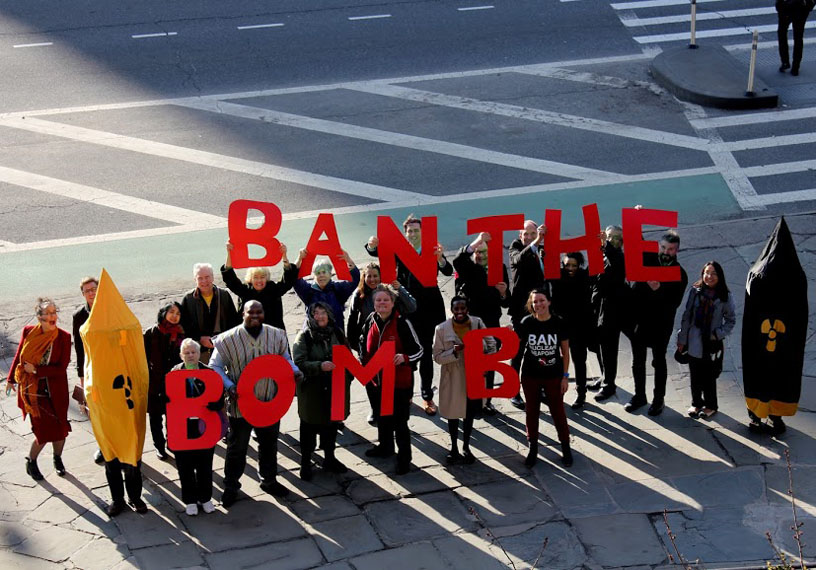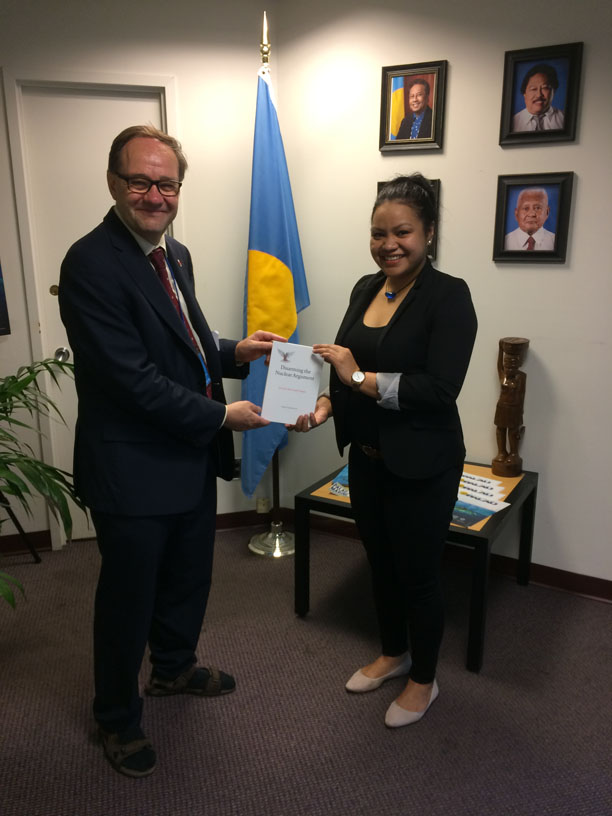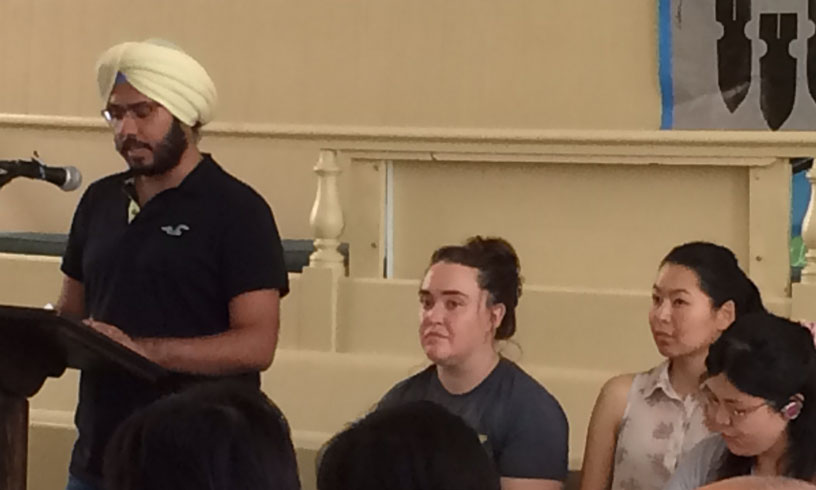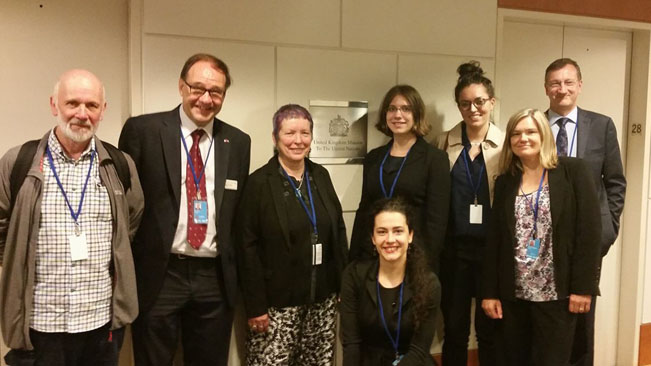Talks edge towards a nuclear-free world
There are high expectations that historic talks at the United Nations in New York will lead to a world free of nuclear weapons. Tim Wallis, Peace and Disarmament Programme Manager, is observing and reports here his daily highlights.
A decision is expected by Friday lunchtime, EDT (maybe 6pm GMT).

Delegates' opening remarks showed great expectations that they will agree a treaty on 7 July that will be a major step on the path to outlawing nuclear weapons. Quakers have campaigned against nuclear weapons since 1955 when Meeting for Sufferings, the Quaker decision-making body, said, "To rely on the possession of nuclear weapons as a deterrent is faithless; to use them is a sin."
While more than 150 countries are taking part, the UK Government has stayed away.
Tim Wallis, Peace and Disarmament Programme Manager, attended the first round of these talks. This round of the Nuclear Ban Treaty conference runs from 15 June until 7 July.
Highlights of the action
Thursday 6 July
Pressing play on the video below could set a third-party cookie. Please see our cookies page to find out more.
Wednesday 5 July
This morning Tim was part of an interfaith vigil outside the UN in front of a wall with the following quote engraved on it: "They shall beat their swords into ploughshares, and their spears into pruning hooks. Nation shall not lift up sword against nation, neither shall they learn war any more." (Isaiah 2.4)
The atmosphere this morning is electric.
A number of contentious issues have been resolved, thanks largely to the facilitation skills of the conference president, Elayne Whyte of Costa Rica. The vast majority of the world's nation-states want to rid the world of nuclear weapons, but they have a wide range of motives for wanting this and an even wider range of ideas for how to put this into the form of a treaty.
For a brief moment, it looked like the withdrawal clause would be removed altogether, but in the end, the text was left exactly as it had been drafted before the hours of debate on it.
This text is a carefully drafted compromise between the two polar positions - allowing a state to withdraw from the treaty if 'extraordinary events' jeopardise their 'supreme interests'. But they can only do that after a 12-month notice period and only if they are not party to an armed conflict at the end of that 12-month period.
North Korea's latest missile test
We are still giving away free copies of "Disarming the Nuclear Argument" to the different UN missions here in New York, including Mission of North Korea (the Democratic People's Republic of Korea).
North Korea's latest missile test and the bellicose response to it from the US administration has been the subject of much discussion here at the UN. But for most people here, the threat posed by North Korea is exactly why we need a nuclear ban treaty.
Surely, building, deploying and threatening other countries with weapons of mass destruction that can destroy entire cities and kill millions of people should be illegal! And so long as a few countries (including the UK) think they have a right to build, deploy and threaten other countries with such weapons, it will be increasingly impossible to stop other countries from doing the same thing. It is therefore the nuclear ban treaty that offers the best hope for a peaceful solution to the North Korea 'problem'.
[QUOTE-START]
Surely, building, deploying and threatening other countries with weapons of mass destruction that can destroy entire cities and kill millions of people, should be illegal.
- Tim Wallis, Quakers in Britain
[QUOTE-END]
For some long-time peace campaigners, this treaty does not go far enough. It contains what they consider to be 'fatal flaws' that would allow NATO countries, for instance, to continue hosting US nuclear weapons on their soil, or other countries to sign the treaty and then later withdraw if they decided they wanted to develop their own nuclear weapons after all.
A treaty is a document that has to be agreed by a large number of countries to be of any use. As was pointed out at our morning briefing, "anyone can write the perfect treaty text, but treaties need to be negotiated" - and that means a treaty involves compromise.
What does the treaty say?
It is important to look at what IS in this treaty. This treaty clearly and unambiguously prohibits the development, testing, production, acquisition, possession, stockpiling, transfer, use or threat of use of nuclear weapons. It prohibits countries from assisting, encouraging or inducing any other country to engage in those activities. It prohibits the stationing, installation or deployment of nuclear weapons at any place under its jurisdiction or control. It requires countries who may have or have had nuclear weapons in the past to cooperate with the relevant international authorities for the purpose of verifying the irreversible elimination of their nuclear weapons programme.
This is an imperfect treaty, but it is hugely significant as a step towards stigmatising and de-legitimising these weapons. And it will certainly go down in history as one of the most important nuclear disarmament treaties of all time.
Earlier daily reports are here:
Tuesday 20 June
While UN negotiations continue in Conference Room 1, my priority is talking to some delegations not in the room. Nearly 80 delegations have copies of the book. I have agreed to hand-deliver copies to some Missions that are scattered around New York City.

I first visited the Mission of Palau - a small island nation in the South Pacific. They are very supportive of the nuclear ban treaty but do not have enough staff in NY to be able to attend all the meetings at the UN. They received a copy of the book and were very friendly.
At the Mission of Malta to the UN, I was invited to meet the ambassador, Carmelo Inguanez. He promised to read the book while relaxing on the beach back in Malta. Malta is part of the Commonwealth and very pro-British in most respects, but they also value their neutrality and are very opposed to nuclear weapons.
[QUOTE-START]
Whenever the treaty is agreed, whatever it ends up saying, and whoever ends up signing it, this is history and it is going to make a difference.
- Tim Wallis
[QUOTE-END]
In a packed programme of side events today, was a session about national parliaments and their role in persuading governments to sign up to this treaty. Caroline Lucas spoke about the situation in the UK. Two MPs from the Netherlands explained how the Dutch parliament did force their government to attend the negotiations, even though they are under intense pressure from the US to boycott, along with other NATO members.
An MP from Germany told us very confidently that Germany will sooner or later sign this treaty. There is overwhelming support for it among the German population (93% according to one opinion poll). Elections in September could lead to a change of government.
Most people attending these negotiations remain optimistic.
Whenever the treaty is agreed, whatever it ends up saying, and whoever ends up signing it, this is history and it is going to make a difference!
This is my last UN report until I go back for the final session on 5-7 July.
Monday 19 June
We handed out more than sixty copies of Disarming the Nuclear Argument to delegates. They appreciated the book because it will equip them to argue the case for a total ban on nuclear weapons with colleagues back home in Foreign Ministries - or with other diplomats here in New York.
At lunchtime, there was a demonstration by local New York peace groups protesting the US government's decision to boycott these negotiations. Protesters sat down in front of the US Mission to the UN and refused to leave. Several were arrested.
In the negotiations, differences are beginning to emerge between countries wanting a very simple, straightforward 'ban' of nuclear weapons and others wanting a more comprehensive treaty involving mechanisms for ensuring compliance and verification, etc. It is not clear yet how these differences will be resolved, but under the skilful leadership of Elayne Whyte of Costa Rica, most people here are in no doubt that they will find a way to resolve them.
Sunday 18 June
Brooklyn Quaker Meeting House was packed out for a conference on nuclear disarmament, organised by Joseph Gerson of American Friends Service Committee (AFSC) and the group 'Peace and Planet'. There was a wide range of speakers, including from Japan, the Marshall Islands and New Zealand. They talked about the significance of the ban treaty and possible next steps to achieve the complete elimination of nuclear weapons.

Saturday 17 June
Each day of the negotiations begins with an interfaith vigil outside the UN buildings. Today led by the World Council of Churches.
We had a constructive 'off-the-record' discussion with Mark Power. He is the Head of Political Affairs at the UK Mission to the UN. I gave him a copy of
Disarming the Nuclear Argument, which he promised to read. An unofficial UK delegation to these negotiations is growing daily and now numbers eight.
Despite a torrential downpour flooding streets and turning placards into soggy rags, thousands joined an upbeat Women's March to Ban the Bomb, through central New York. The UK's only Green MP, Caroline Lucas, was a keynote speaker at the rally.
Friday 16 June
Today Tim Wallis led an early morning interfaith vigil.
Tim reported that the room was positively buzzing as the negotiations got under way, with a first draft of a nuclear ban treaty on the table and ready to be negotiated in detail.
Absent: many of the big European countries, including the UK.
Present : official delegates from nearly 90 countries and more than 100 observers from civil society. The countries of Africa, Latin America and Asia - and small island nations of the South Pacific - are finding their voice and letting it be heard in the halls of international diplomacy.
Contributions from Lichtenstein and Ukraine, not present till now.
Many countries need to be brought on board with this process, but the treaty will go ahead without them. Tim writes: “The priority for faith groups, however, is convincing more countries present at the negotiations to contribute to the discussion; convincing more countries who have said they support such a treaty to attend the negotiations; and convincing those countries who should know better to turn their backs on the US-UK love affair with nuclear weapons and to 'come out' firmly in favour of their elimination."
A few ambassadors attended our book launch for Disarming the Nuclear Argument, in Conference Room B at the UN. Thanks to the generosity of Abolition 2000 UK, a free copy is being given to each UN delegation.

Thursday 15 June
Delegates' opening remarks today show great expectations that they will agree a treaty on 7 July that will be a major step on the path to outlawing nuclear weapons. Quakers have campaigned against nuclear weapons since 1955 when their decision-making body, Meeting for Sufferings, said, "To rely on the possession of nuclear weapons as a deterrent is faithless; to use them is a sin."
While more than 150 countries are lined up to take part, the UK Government is staying away.
[QUOTE-START]
To rely on the possession of nuclear weapons as a deterrent is faithless; to use them is a sin.
- Meeting for Sufferings 1955
[QUOTE-END]
Tim Wallis will join the daily vigil, meet ambassadors, observe sessions and join marches. On Sunday, American Friends Service Committee has a conference at Brooklyn Friends Meeting House, called 'No Nukes, No Walls, No Warming'.
This round of the Nuclear Ban Treaty conference runs from 15 June until 7 July.
Tim Wallis attended the first round of these talks. He is representing Quakers in Britain and Quakers worldwide through Friends World Committee for Consultation.
Tim is programme manager for Quaker Peace & Social Witness and author of The Truth about Trident.